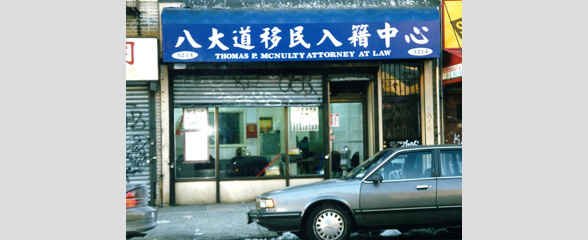 | In this interview, the narrator relates her life story with a backdrop of generations of her family history. She describes Vietnam, living in Saigon, the Vietcong takeover, the process of her family fleeing, and immigrating to America as a refugee. The narrator discusses her entrepreneurial pursuits by evaluating each business that she started along with each demise. She looks at the real estate business in the Sunset Park neighborhood of Brooklyn; providing general rent information and identifying the future prospects for the area and its Chinese American residents. Interview in Mandarin conducted by Gregory Ruf. | 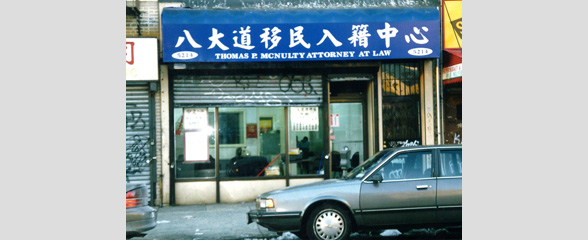 | In this interview, the narrator provides an overview of her life; both before and after immigrating to New York City from Hong Kong. She discusses her childhood and private schooling in Kowloon, her decision to move to America with her husband and her trip to New York City in the 1960s. The narrator recounts the evolution of her career; from typist, to bridal gown seamstress, to art gallery owner. She offers her thoughts on parenting and practical home economics and provides an overview of the financial situation faced by Chinese immigrants and small business owners. Interview in Mandarin conducted by Gregory Ruf. | 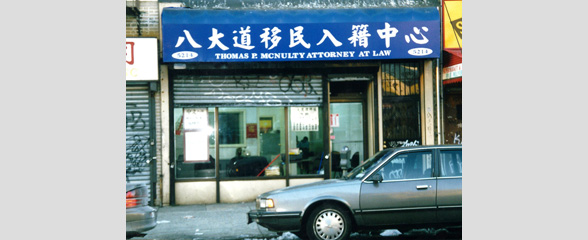 | In this interview, Lou Castaldo discusses the business of his father; Vinnies Pizzeria was established during the early 1970s in the Sunset Park neighborhood of Brooklyn. He recounts his father coming to America and life before starting the business. Castaldo describes the various ethnic cultures and neighborhoods he observed while growing up in Brooklyn; including significant events, activities, hobbies, family life and traditions. Castaldo recalls a significant period of change in Sunset Park, beginning in 1979; from a European American neighborhood comprised of Germans, Greeks, Irish, Italians, and Norwegians to an Asian American neighborhood, largely of Chinese heritage. He evaluates other influences that factored into the changing neighborhood; escalating crime rates and drug use, business closures, new Chinese American ownership of businesses and housing, cultural differences and language barriers, and national politics supporting or allowing illegal aliens to enter and live in the United States. He surveys the Sunset Park community actions to create a more global and shared sense of community-a melting pot of cultures. Interview conducted by Gregory Ruf. | 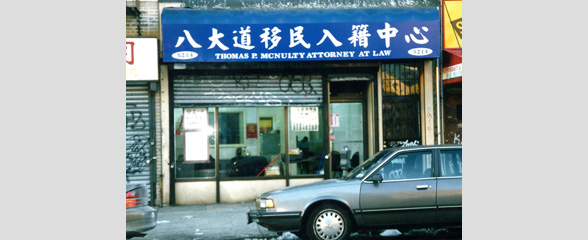 | In this interview, Guo Wa "Grace" Chan discusses her immigration and life in New York City. She focuses on her experiences as a businesswoman, detailing the launch of her video rental store. She mentions her husband ventures in the restaurant industry. Chan describes the entrepreneurial competition in Brooklyn Chinatown and real estate prices, commercial as well as residential. An educationally-focused mother, Chan evaluates the educational decisions she has made and the quality of local public and private schools. Interview in Cantonese conducted by Mary Lui. | 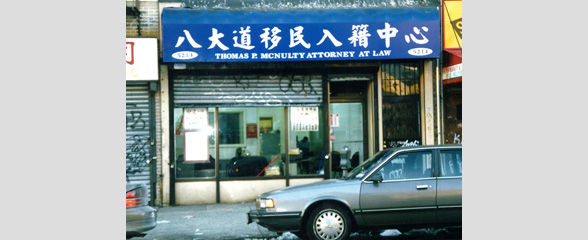 | In this interview Kwok-Wai "David" Chan relates his experience as a Chinese immigrant to New York City. He describes his reasons for emigrating, the family arrival to Brooklyn, and hardships faced soon after. He discusses his education and the value his family places in higher education --something he calls a Chinese value. Chan details his career as an entrepreneur; including failures, challenges, and accomplishments. Throughout the interview, Chan discusses the community changes he has watched over the last few decades. Interview conducted by Mary Lui. | 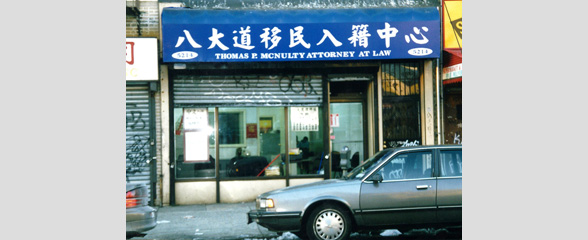 | In this interview, Yan Chen talks about her life in Mainland China where she was born and grew up; the family home, farm, her family, extended family, and many farm animals. Chen recalls how, at age ten, she and her family came to the United States through the help of extended family. She remembers that her parents were hoping to make a lot of money in America without having to work too hard. The interview mainly consists of Chen discussing her relationship to the two areas where she lived-the Chinatown neighborhood of Manhattan and the Sunset Park neighborhood of Brooklyn-and her sense of place within them. She describes her family experiences, her education and friendships, demographic shifts within the neighborhoods, problems with bullying, crime and gangs, Chinese home ownership, and the establishment of Chinese businesses; all factors which helped to stabilize the Chinese community and allowed her family to prosper. Interview conducted by Mary Lui. | 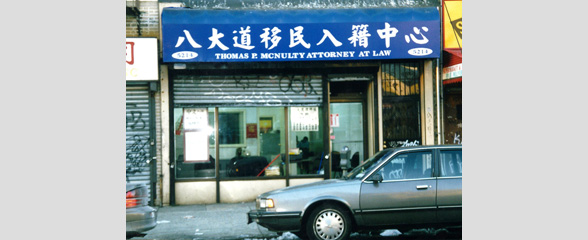 | In this interview, Huan Reng "Benson" Chin discusses his involvement in the Sino-Japanese war; conducting espionage for the Chinese Communist Party. He recalls his military education in Marxism/ Leninism and fighting in World War II. Chin speaks of the Chinese Cultural Revolution; including detention in labor camps, mass starvation, and numerous civilian suicides. Chin evaluates life after his 1984 immigration to New York City; Chinatowns of the boroughs, Sunset Park street crime, and looking forward to retirement. Interview in Cantonese conducted by Mary Lui. | 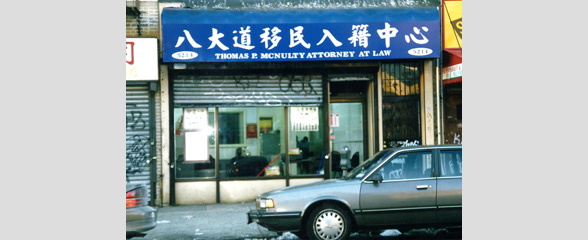 | In this interview, Wong Lai Chow describes her life history; which spans the Japanese invasion of China, World War II, the Korean War, the Chinese Cultural Revolution, and her immigration to America in 1980. She recalls her career as an educator during the Chinese Cultural Revolution, being charged with "illicit relations with a foreign country," and re-education at a hard labor camp. Chow also speaks from her perspective of an active retiree in the Sunset Park neighborhood of Brooklyn. She discusses neighborhood crime, the Chinese mafia, and unlicensed dentists of Sunset Park. Chow also observes the challenges faced by her children, who came to America without command of English or many marketable skills. Interview conducted in Cantonese by Ka-Kam Chui. | 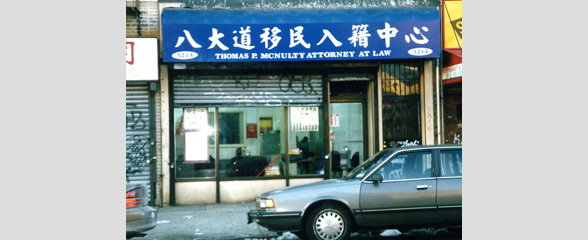 | In this interview, June Flodsand recounts her life as a working-class, first-generation American, a devout Lutheran of Norwegian parentage. She remembers an innocent childhood of family chores, a first job as a soda jerk, and weekly participation in church and its activities. As an adult, Flodsand married a fellow Lutheran and continued a life devoted to work, church, Norwegian-themed festivities, and socializing. Flodsand laments the Brooklyn neighborhood of Sunset Park transition from a dominant Scandinavian culture to a largely Chinese and Hasidic population. She was interviewed at the Lutheran Church where she is a member. Interview conducted by Gregory Ruf. | 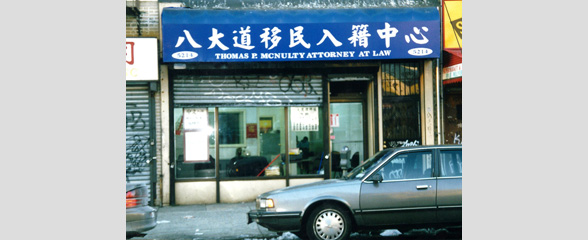 | By outlining the experiences of the two prior generations, Tony Giordano explains in the interview how his family of Italian heritage came to be in Brooklyn. He focuses on his father occupations; ultimately one as a bus driver. Giordano describes his upbringing in terms of his family apartment housing, Brooklyn neighborhoods, vacations on Long Island, education from first grade through college, and his Roman Catholic religious experience. The interview is in depth on his experience of losing faith in organized religion and later discovering a devotion to God. Contributing to this struggle with religion, Giordano talks about a failed first marriage, custody challenges over his son, a rekindled relationship, and a happy, interfaith marriage and family. He focuses on the ethnic heritage and late twentieth century makeup of the Sunset Park community and his role as a civic leader. The influx of large numbers of Chinese into Sunset Park in the late 1980s has created what Giordano calls the "Third Chinatown." Interview conducted by Gregory Ruf. |









